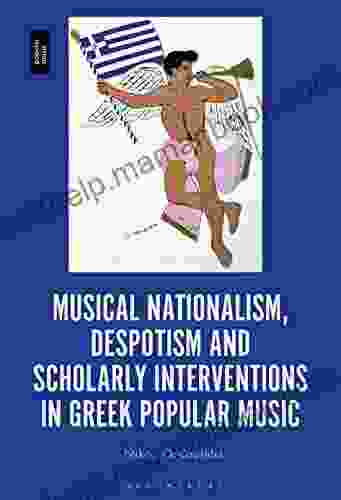Musical Nationalism, Despotism, and Scholarly Interventions in Greek Popular Music

Greek popular music has a long and rich history, which has been shaped by a variety of factors, including political, social, and cultural influences. One of the most significant factors that has shaped Greek popular music is musical nationalism. Musical nationalism is a form of nationalism that emphasizes the importance of music in expressing and promoting national identity. In Greece, musical nationalism has been a powerful force since the 19th century, and it has played a major role in shaping the development of Greek popular music.
5 out of 5
| Language | : | English |
| File size | : | 1063 KB |
| Text-to-Speech | : | Enabled |
| Screen Reader | : | Supported |
| Enhanced typesetting | : | Enabled |
| Word Wise | : | Enabled |
| Print length | : | 188 pages |
| Lending | : | Enabled |
In this article, I will explore the complex relationship between musical nationalism, despotism, and scholarly interventions in Greek popular music. I will draw on a range of historical and contemporary sources to examine how Greek popular music has been shaped by nationalist ideologies and political power, and how scholars have played a role in shaping its meanings and significance.
Musical Nationalism in Greece
The roots of musical nationalism in Greece can be traced back to the 19th century, when Greece was struggling for independence from the Ottoman Empire. During this period, Greek musicians and intellectuals began to collect and perform traditional Greek folk songs and dances. These songs and dances were seen as symbols of Greek national identity, and they were used to promote a sense of unity and patriotism among Greeks.
After Greece gained independence in 1829, musical nationalism continued to be a powerful force in Greek society. Greek musicians and composers began to incorporate traditional Greek elements into their works, and they also began to create new works that were explicitly nationalist in character. These works often celebrated Greek history, culture, and achievements, and they helped to create a sense of national pride among Greeks.
Musical nationalism reached its peak in Greece during the 20th century. During this period, Greek musicians and composers created some of the most iconic works of Greek popular music, including the songs "Ta Paidia tis Ellados" (The Children of Greece) and "O Xenos" (The Stranger). These songs became anthems of Greek nationalism, and they were used to promote a sense of unity and patriotism among Greeks.
Despotism and Greek Popular Music
Musical nationalism has not always been a positive force in Greek popular music. In the 20th century, musical nationalism was often used by dictatorships to promote their own political agendas. For example, the Metaxas dictatorship (1936-1941) used musical nationalism to promote a cult of personality around the dictator, Ioannis Metaxas. The dictatorship also banned certain types of music, such as jazz and Western pop music, which it deemed to be un-Greek.
The Papadopoulos dictatorship (1967-1974) also used musical nationalism to promote its own political agenda. The dictatorship created a new national anthem, "Eisai Monaxos" (You Are Alone),which was written by the dictator, Georgios Papadopoulos. The dictatorship also banned certain types of music, such as rock and roll and folk music, which it deemed to be subversive.
The use of musical nationalism by dictatorships in Greece had a negative impact on Greek popular music. It stifled creativity and innovation, and it prevented Greek musicians from expressing themselves freely.
Scholarly Interventions in Greek Popular Music
Scholars have played a significant role in shaping the meanings and significance of Greek popular music. In the 20th century, scholars began to collect and study traditional Greek folk songs and dances. This work helped to preserve these songs and dances and to make them more accessible to the general public. Scholars also began to write about the history of Greek popular music, and they helped to create a body of knowledge about this important aspect of Greek culture.
In the 21st century, scholars continue to play an important role in the study of Greek popular music. They are researching the history of Greek popular music, they are analyzing the music itself, and they are exploring the social and cultural significance of Greek popular music. Their work is helping to deepen our understanding of this important aspect of Greek culture.
Musical nationalism has been a powerful force in the development of Greek popular music. It has been used to promote national unity and patriotism, but it has also been used by dictatorships to promote their own political agendas. Scholars have played a significant role in shaping the meanings and significance of Greek popular music. They have collected and studied traditional Greek folk songs and dances, they have written about the history of Greek popular music, and they have explored its social and cultural significance. Their work is helping to deepen our understanding of this important aspect of Greek culture.
5 out of 5
| Language | : | English |
| File size | : | 1063 KB |
| Text-to-Speech | : | Enabled |
| Screen Reader | : | Supported |
| Enhanced typesetting | : | Enabled |
| Word Wise | : | Enabled |
| Print length | : | 188 pages |
| Lending | : | Enabled |
Do you want to contribute by writing guest posts on this blog?
Please contact us and send us a resume of previous articles that you have written.
 Top Book
Top Book Novel
Novel Fiction
Fiction Nonfiction
Nonfiction Literature
Literature Paperback
Paperback Hardcover
Hardcover E-book
E-book Audiobook
Audiobook Bestseller
Bestseller Classic
Classic Mystery
Mystery Thriller
Thriller Romance
Romance Fantasy
Fantasy Science Fiction
Science Fiction Biography
Biography Memoir
Memoir Autobiography
Autobiography Poetry
Poetry Drama
Drama Historical Fiction
Historical Fiction Self-help
Self-help Young Adult
Young Adult Childrens Books
Childrens Books Graphic Novel
Graphic Novel Anthology
Anthology Series
Series Encyclopedia
Encyclopedia Reference
Reference Guidebook
Guidebook Textbook
Textbook Workbook
Workbook Journal
Journal Diary
Diary Manuscript
Manuscript Folio
Folio Pulp Fiction
Pulp Fiction Short Stories
Short Stories Fairy Tales
Fairy Tales Fables
Fables Mythology
Mythology Philosophy
Philosophy Religion
Religion Spirituality
Spirituality Essays
Essays Critique
Critique Commentary
Commentary Glossary
Glossary Bibliography
Bibliography Index
Index Table of Contents
Table of Contents Preface
Preface Introduction
Introduction Foreword
Foreword Afterword
Afterword Appendices
Appendices Annotations
Annotations Footnotes
Footnotes Epilogue
Epilogue Prologue
Prologue Amber Branch
Amber Branch Youngsang Cho
Youngsang Cho Jennifer Hillier
Jennifer Hillier Richard Selzer
Richard Selzer Reta Halteman Finger
Reta Halteman Finger Arthur Rackham
Arthur Rackham Stephen Harrigan
Stephen Harrigan Catherine Jones
Catherine Jones Gaurav Mahajan
Gaurav Mahajan Sarah Mallory
Sarah Mallory V R Christensen
V R Christensen Amelia Hepworth
Amelia Hepworth Valter Longo
Valter Longo Maria Dahvana Headley
Maria Dahvana Headley Gergely Orosz
Gergely Orosz Micaiah Johnson
Micaiah Johnson Jennifer Sheehan
Jennifer Sheehan Naomi Judd
Naomi Judd Paris Hyde
Paris Hyde M E Sarotte
M E Sarotte
Light bulbAdvertise smarter! Our strategic ad space ensures maximum exposure. Reserve your spot today!

 Lawrence BellThe Violet Fairy Dover Children Classics: A Treasured Journey into the Heart...
Lawrence BellThe Violet Fairy Dover Children Classics: A Treasured Journey into the Heart... Quentin PowellFollow ·3.2k
Quentin PowellFollow ·3.2k Henry GreenFollow ·6.3k
Henry GreenFollow ·6.3k Daniel KnightFollow ·19.5k
Daniel KnightFollow ·19.5k Cormac McCarthyFollow ·7.8k
Cormac McCarthyFollow ·7.8k William GoldingFollow ·9.6k
William GoldingFollow ·9.6k W. Somerset MaughamFollow ·16k
W. Somerset MaughamFollow ·16k Morris CarterFollow ·7.3k
Morris CarterFollow ·7.3k Mario Vargas LlosaFollow ·6.1k
Mario Vargas LlosaFollow ·6.1k

 Boris Pasternak
Boris PasternakThe Misted Mirror: Mindfulness for Schools and...
What is The Misted...

 Holden Bell
Holden BellEmbark on Thrilling Adventures in the Uncharted Depths of...
Unveiling the Enchanting...

 Seth Hayes
Seth HayesDelphi Complete Works of Lucan: Illustrated Delphi...
This meticulously edited...

 Jackson Hayes
Jackson HayesThe Enigmatic Cat Burglar: Unraveling the Intriguing...
In the annals of crime, the name Bernie...

 Quentin Powell
Quentin PowellAligned With The Cisa Review Manual 2024 To Help You...
The CISA Review Manual 2024 is the most...

 Austin Ford
Austin FordUnlocking Revenue Potential: A Comprehensive Business...
In today's digital...
5 out of 5
| Language | : | English |
| File size | : | 1063 KB |
| Text-to-Speech | : | Enabled |
| Screen Reader | : | Supported |
| Enhanced typesetting | : | Enabled |
| Word Wise | : | Enabled |
| Print length | : | 188 pages |
| Lending | : | Enabled |










